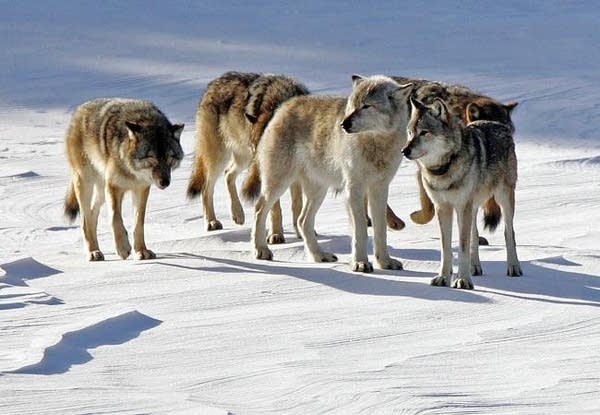Wolf pups on Isle Royale, a howl of hope for struggling population

Go Deeper.
Create an account or log in to save stories.
Like this?
Thanks for liking this story! We have added it to a list of your favorite stories.

The yips and howls of wolf pups are a welcome addition to the sounds of Isle Royale, Mich. this summer. It is a bit of surprising good news for the island's dwindling wolf population.
Michigan Tech researcher Rolf Peterson said he heard the pups in July.
He emailed Michigan Radio about the news:
Turn Up Your Support
MPR News helps you turn down the noise and build shared understanding. Turn up your support for this public resource and keep trusted journalism accessible to all.
"The pups born this year mean that the wolves have not completely lost all genetic viability, but it doesn't mean they're about to recover, and it doesn't mean that they have somehow escaped from genetic problems. Twenty years ago the population was in approximately the same situation, with a dozen wolves present (the difference now is that the population is lower, because of the mortality from the mine shaft incident) - only two of the three packs present were reproducing, and litter size was small. Now we have one of two packs that reproduced (this year, no packs reproduced last year), and litter size was small. In the early 1990's the situation was resolved by the arrival of an immigrant male with some more competitive genes, and the wolf population was strong for another 15 years.
via Michigan Radio.
Peterson explained the dire situation the Isle Royale wolves are in with MPR News host Tom Crann.
Crann: The National Park Service is considering intervening in some way. What could be done?
Peterson: There could be some things that could be done before extinction. New genetic material could be brought in, in the form of new wolves. Females could be dumped off — they'd probably be greeted with open arms by most of the wolves there now.
But there's a long tradition of non-intervention at Isle Royale. Among all the national parks, that non-intervention strategy probably has worked best at Isle Royale. Another option would be to let the wolves do the best they can and if they go to extinction, consider whether it's appropriate to reintroduce wolves at that point.
Crann: Given the policy in national parks of non-intervention and the history there, could you see an exception here being made and maybe some females introduced in order to keep this population going?
Peterson: It would make just as much sense and maybe be a little more consistent with policy to not intervene until extinction occurs. My recommendation, all things considered, would be to restore wolves to the island [after extinction].
But there are well known geneticists who would argue that they should be genetically rescued now, and that restoration after extinction might not work quite so well. So, there are some different points of view out there, even among scientists.


